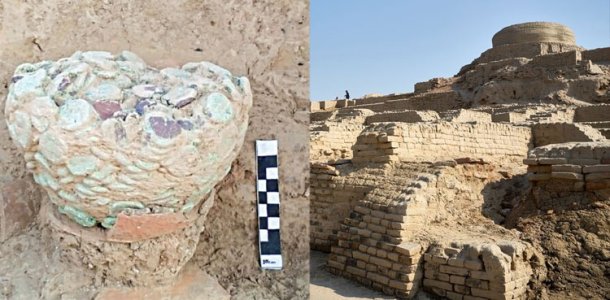- Joined
- Sep 11, 2023
- Runs
- 24,096
In a major discovery, a team of experts announced unearthing a pot full of copper coins from the archaeological site, Mohenjo Daro, which they saw as the first remarkable discovery of artefacts at the 5,000-year-old city remains after 93 years.
Sources disclosed that a group of labourers were excavating a collapsed wall when they came across a pot full of ancient copper coins in the ancient city.
Director of Archaeology Mohenjodaro, Dr Syed Shakir Shah, who led the team comprising archaeological conservator Ghulam Shabir Joyo, had confirmed that the staff busy with preservation work had stumbled upon the pot of coins on Wednesday.
Sources said that the jar of coins weighing about five and a half kilogram was later shifted to the soil testing laboratory.
Tourists used to visit the 26th century B.C. Mohenjo Daro near Larkana in Sindh, one of the largest cities in of the ancient Indus Valley Civilization.

Source: ARY

 arynews.tv
arynews.tv
Sources disclosed that a group of labourers were excavating a collapsed wall when they came across a pot full of ancient copper coins in the ancient city.
Director of Archaeology Mohenjodaro, Dr Syed Shakir Shah, who led the team comprising archaeological conservator Ghulam Shabir Joyo, had confirmed that the staff busy with preservation work had stumbled upon the pot of coins on Wednesday.
Sources said that the jar of coins weighing about five and a half kilogram was later shifted to the soil testing laboratory.
Tourists used to visit the 26th century B.C. Mohenjo Daro near Larkana in Sindh, one of the largest cities in of the ancient Indus Valley Civilization.

Source: ARY

Copper coins recovered from Mohenjo Daro
In a major discovery, a team of experts announced unearthing a pot full of copper coins from the archaeological site, Mohenjo Daro, which they saw as the












